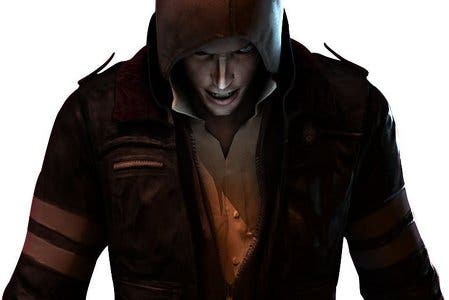Retrospective: Prototype
Beg for Mercer.
Among the thousands of innocent civilians occupying Prototype's Manhattan, there are a few that have been singled out, the ominous big brother of that terrifying Lottery hand pointing a conspicuous finger at their heads.
That person will then have something altogether inhuman hurtle into them, grab them forcefully and then tear them into little pieces that can be gobbled up by a dozen messy tentacles.
To be fair, those are the lucky ones.
Their deaths are quick, and, while painful, seem to be over relatively quickly. More importantly, their murders seem to have at least a purpose, some sort of intent behind them, which provides a modicum of reassurance. It's nice to know you died for something, even if you don't know exactly what that something is.
The rest? They get infected, turn into zombies, get cut down by the military, run over by fleeing cars, or consumed by the horde. Meaningless, accidental slaughter. There is another way they might die, though. And that's if Alex Mercer forgets what button combo he needs to hit to do the vertical slice, and instead performs a elbow slam into the ground, killing everyone nearby in the shockwave. Oops.
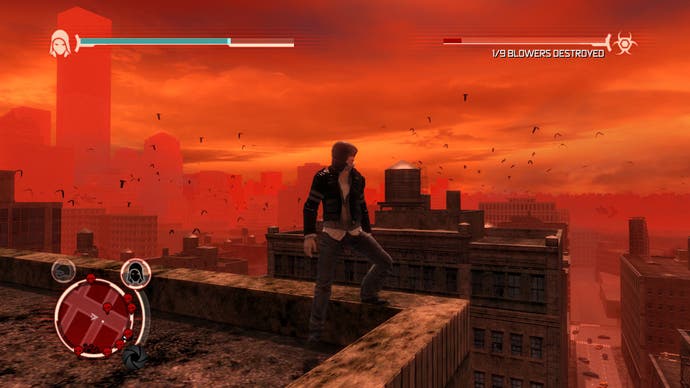
As players we've been conditioned by HUD elements. Like magpies drawn to silver, when you see something pop up on the HUD, you do what it says. Or, at the very least, you go and investigate. Those lucky few, those who Mercer decides to rip apart and gobble up, they're that silver, because the HUD shoves a great big circle over their heads.
As players, we're conditioned to obey the HUD. And so we rip and we gobble, because Mercer isn't really the one deciding who to kill. He's not the one with the controller in his hand. He's also not the one putting big attractive circles above their heads.
That's not the only reason we gobble, though. There's another. Each gobblee contains valuable information about what's going on; they either worked on the virus that's rampaging through Manhattan, or are part of the military periphery that's taken over Manhattan island.
As you consume each one, you get a blast of images, each one filling in a few extra blanks, leaving you with a few less questions. So you keep an eye out for that circle, that little glittering HUD element, because you want to know why.
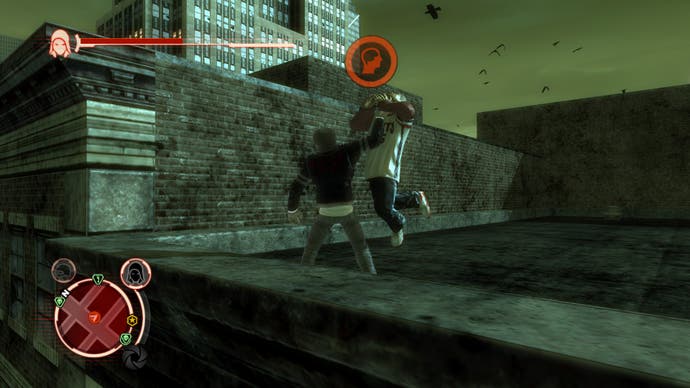
On the surface, Prototype is mindless fun. The beauty is in the slaughter, in being this overpowered, psychopathic monster that can destroy tanks with his arms and hurl yellow cabs at helicopters, causing explosions and crashes that create even more destruction. The challenge of the game is in conducting all this chaos, and being able to put your heady capacity for violence and gore in the exact right place, at the exact right time. You need to be Chopin care of Patrick Bateman.
The thing is, you're not that. You're just a player with a controller, and there are too many combos and buttons to properly have that much control over what you're doing, and where you're doing it. Accidents happen - and when Alex Mercer has an accident, people die.
Prototype is kind enough to let you know, after the fact, quite how costly that accident was. Up rolls the cost to the Military, in the millions and then billions, as well as how many infected, military, and, most guiltily, civilian causalities you've caused.
Despite revelling in all this viscera, Prototype isn't a game that wants you to revel along with it. So much in the design is about creating a situation that seems innocuous enough, like the 'Targets of Interest' (the gobblees), and, after the 50th person you mindlessly tear apart and hoover up, you start to question the moral validity of what you're doing. While these people may have worked on the virus or with the military, does that mean they really deserve to be gobbled? Is that little flash of narrative worth the death of a potential innocent?
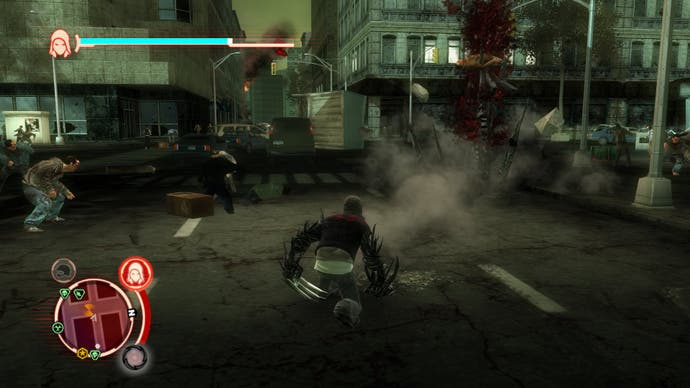
It doesn't stop there, either, with the actual narrative following a line that puts Mercer more and more into a moral grey area, before heading aggressively into the moral black. He starts with amnesia, but the more knowledge you get, the less you really want. Turns out, Mercer did some pretty nasty stuff. Turns out, in fact, that Mercer isn't a good person. Turns out, in fact, that Mercer isn't a person at all. Because, you see... well, it's complicated.
Exactly what Mercer is has preyed on me ever since I finished Prototype. The short, simple answer is that he's a borderline psychopath, albeit pushed to that situation by the circumstances he finds himself in. More than that, though, he's the virus made man, the infection run rampant so that it replaces every part of what was once human, leaving instead a confused thing that has Mercer's vague memories, but little of the man himself.
He's also the villain. Prototype sets up a few bad guys with its narrative, but Elizabeth Green, the major opponent, is essentially in the same situation as Mercer, infected and confused, acting out of a need to survive, and merely framed as antagonist by a biased narrative.
Then there's Robert Cross, the military captain who is tasked with terminating Mercer. While he's certainly arrogant and somewhat amoral, he's the only one who actually has a justifiable, moral imperative to follow. The military might have created the virus, but it's not like Mercer is helping things killing them as they try to contain it.
So he's the villain. Because he kills civilians for selfish purposes, slaughters the military in their thousands, and seems more concerned with getting out of Manhattan than saving anyone inside it. The twist is that it took much, much longer than it should have for me to realise this.
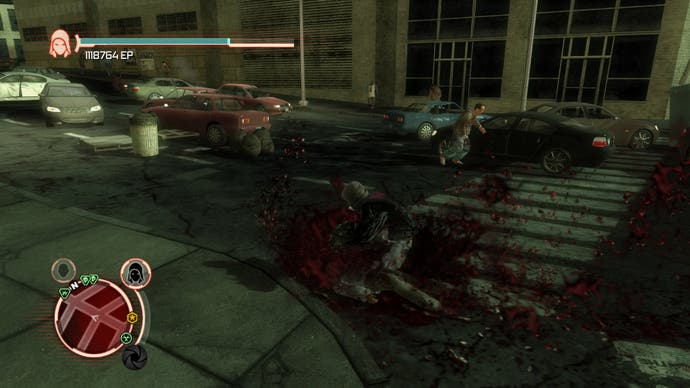
Because Mercer isn't the villain in the narrative. He's not looking from side to side and hiding in the shadows. He's not backlit. Mercer is only the villain, only the reprehensible monster that he is, during the times when the player has the control.
Developer Radical has successfully tricked you, the player, into acting like a complete bastard while at the same time thinking you're doing the right thing. It's used game systems that are established, make sense, and are visually attractive to trick you into acting how Mercer acts. It's quietly genius.
Prototype isn't a flawless game, by any stretch of the imagination. And while you can argue that the clumsy controls are by intention, and the fact that Mercer handles like a fighter jet in the hands of a toddler is by design, the repetitive missions, jumbled narrative and lack of impact of any of your actions within Manhattan all work against it.
But that concept, of twisting game mechanics for a narrative payoff that you feel complicit in is something that deserves to be lauded. And it's something that's smartly alluded to in the choice of villain for the sequel.
I'll give you a hint who it is. His name is Alex, and he gobbles people up.
